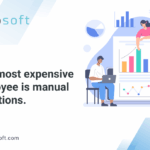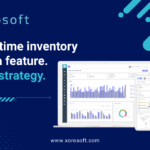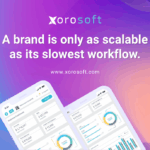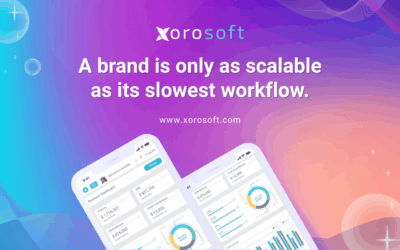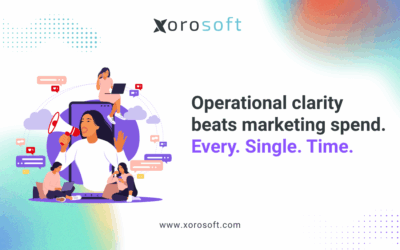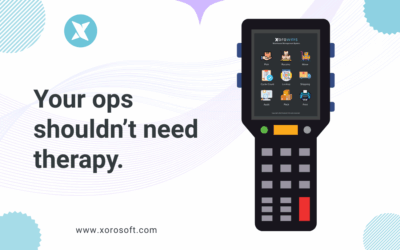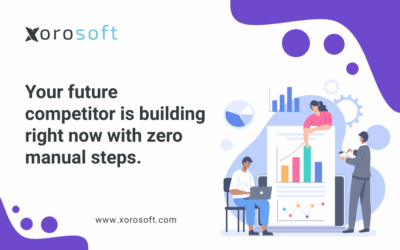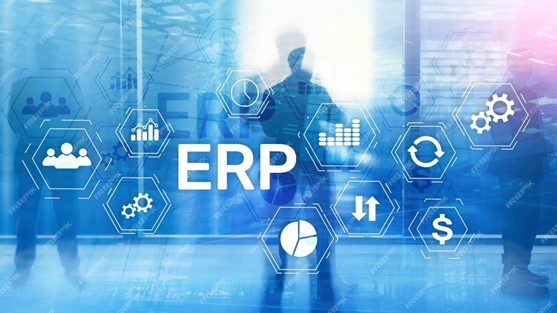
Introduction to ERP Systems: The Backbone of Modern Businesses
In today’s rapidly evolving business landscape, Enterprise Resource Planning (ERP) systems have emerged as the backbone of modern organizations. They serve as integrated solutions that streamline processes across various departments, facilitating efficient management of resources and information. As I delve into the world of ERP systems, it becomes clear that choosing the right ERP solution greatly impacts productivity, decision-making, and overall business success.
An ERP system consolidates data from different business functions like finance, human resources, sales, and inventory into a single platform. This integration allows for real-time data access, which is crucial for making informed decisions. By eliminating data silos, organizations can enhance collaboration among teams, leading to improved efficiency and reduced operational costs. In my experience, businesses that invest in a robust ERP solution like XoroERP often find themselves better equipped to navigate market challenges.
As we explore the differences between QuickBooks and XoroERP, I find it essential to understand the unique advantages that each ERP system brings to the table. QuickBooks has long been a popular choice for small to medium-sized businesses, primarily due to its user-friendly interface and financial management capabilities. However, as businesses grow and their needs become more complex, they often seek more comprehensive solutions like XoroERP that can adapt to their evolving requirements.
QuickBooks vs. XoroERP: A Comprehensive Comparison
When comparing QuickBooks and XoroERP, several factors come into play that can influence a business’s decision. While QuickBooks excels in basic accounting functions, XoroERP offers a more extensive suite of tools designed for comprehensive resource management. This difference is crucial for organizations aiming for long-term growth and scalability.
Comparison Table
| Feature | QuickBooks | XoroERP |
|---|---|---|
| Target Audience | Small to Medium Businesses | Medium to Large Enterprises |
| Core Functionality | Accounting and Financial Tools | All-in-One ERP System |
| Customization | Limited | Highly Customizable |
| Integration | Basic Integrations | Extensive Third-Party Integrations |
| User Experience | User-Friendly | Intuitive and Advanced Interface |
From my perspective, the choice between QuickBooks and XoroERP hinges on the specific needs of the business. While QuickBooks may be sufficient for straightforward accounting tasks, companies with more complex processes will benefit significantly from the comprehensive features offered by XoroERP. The enhanced capabilities of XoroERP make it a more suitable ERP solution for businesses anticipating future growth.
Furthermore, the scalability of XoroERP allows organizations to expand their operations without the need for frequent software changes. This flexibility is essential for businesses aiming to remain competitive in their industries. In my experience, companies that recognize the importance of scalable solutions tend to achieve better long-term results.
Key Features of XoroERP That Set It Apart
XoroERP boasts several key features that distinguish it from QuickBooks and other competitors in the market. These functionalities not only enhance operational efficiency but also position XoroERP as a leading choice for businesses seeking a reliable ERP system.
- Integrated Modules: One of the standout features of XoroERP is its modular architecture, which allows businesses to pick and choose the functionalities they need. Whether it’s inventory management, accounting, or customer relationship management, each module works seamlessly together, ensuring that all departments are aligned and informed.
- Advanced Reporting Capabilities: The reporting tools within XoroERP enable businesses to generate detailed insights into their operations. This feature is invaluable for decision-making, as it allows stakeholders to identify trends, monitor performance, and make data-driven decisions. I’ve found that organizations leveraging these insights often outperform their competitors.
- Custom Workflow Automation: XoroERP also provides the ability to automate various workflows, reducing manual effort and minimizing the risk of errors. Customizable workflows can be tailored to fit unique business processes, allowing teams to focus on strategic initiatives rather than mundane tasks. This level of automation is something I find particularly beneficial for resource allocation and time management.
With these features, XoroERP not only streamlines operations but also enhances the overall user experience. The combination of flexibility, in-depth analytics, and automation makes it a compelling choice for organizations striving for efficiency and growth.
Streamlined Inventory Management with XoroERP
Effective inventory management is crucial for businesses looking to optimize their supply chain and reduce costs. XoroERP excels in this area, providing a sophisticated inventory management system that ensures accuracy and efficiency.
Key Benefits of XoroERP’s Inventory Management System
- Real-Time Tracking: XoroERP allows businesses to monitor inventory levels in real-time, enabling them to make timely decisions regarding stock replenishment. This feature minimizes the risk of stockouts and overstock situations, which can significantly impact cash flow.
- Automated Reordering: With built-in reorder alerts and automated purchasing processes, XoroERP helps maintain optimal inventory levels with minimal manual intervention. This automation leads to better inventory turnover rates and ensures that businesses are prepared to meet customer demand.
- Comprehensive Reporting: The system generates detailed reports on inventory performance, giving businesses insights into which products are performing well and which are lagging. This information is invaluable for strategic planning and helps organizations make informed decisions about product offerings.
In my experience, businesses that implement an advanced inventory management system like XoroERP often see significant improvements in operational efficiency and cost savings. By streamlining inventory processes, organizations can enhance customer satisfaction and drive revenue growth.
Advanced Accounting Capabilities of XoroERP
While QuickBooks is well-known for its accounting features, XoroERP takes financial management to the next level with its advanced accounting capabilities. These functionalities are designed to meet the needs of growing businesses and provide a comprehensive view of financial performance.
Key Accounting Features in XoroERP
- Multi-Currency Support: For businesses operating globally, XoroERP provides multi-currency accounting, allowing for seamless transactions across different regions. This feature ensures accurate financial reporting and simplifies the complexities of international trade.
- Automated Financial Reporting: XoroERP offers automated reporting tools that generate financial statements, balance sheets, and cash flow reports with minimal manual input. This automation reduces the time spent on preparing financial documents, allowing teams to focus on analysis and strategy.
- Advanced Budgeting Tools: The budgeting functionalities in XoroERP enable organizations to create, track, and manage budgets effectively. This capability is essential for ensuring financial discipline and supporting strategic decision-making.
By leveraging these advanced accounting features, businesses can gain a deeper understanding of their financial health and make more informed strategic decisions. The comprehensive financial management offered by XoroERP positions it as a superior ERP solution compared to QuickBooks.
Xorosoft’s Commitment to User-Friendly Interface and Experience
One of the standout aspects that I appreciate about Xorosoft’s ERP solution is its commitment to user-friendly design. A sophisticated system is only as good as its usability, and XoroERP has prioritized creating an intuitive interface that caters to users of all skill levels.
Key Elements of User Experience
- Intuitive Dashboard: The dashboard provides a centralized view of key metrics and essential functions. Users can easily navigate through various modules, making it simple to access critical information without extensive training. This ease of use is something I find particularly beneficial for onboarding new employees.
- Customizable User Settings: XoroERP allows users to customize their settings and dashboard layouts according to their preferences. This personalization helps users stay organized and improves productivity by reducing the time spent searching for information.
- Comprehensive Support Resources: Xorosoft provides extensive documentation, tutorials, and customer support to assist users in utilizing the system effectively. This commitment to customer education ensures that businesses can maximize their investment in the ERP solution.
In my view, a user-friendly interface is essential for driving adoption and ensuring that teams can leverage the full potential of an ERP system. XoroERP’s focus on user experience makes it a top choice for organizations looking to enhance efficiency through technology.
Scalability and Flexibility: Why XoroERP is Future-Proof
As businesses evolve, their operational needs change. XoroERP stands out as a future-proof solution due to its inherent scalability and flexibility, allowing organizations to adapt to growth and market fluctuations seamlessly.
Scalability Features of XoroERP
- Modular Design: The modular design of XoroERP enables businesses to add new functionalities as they grow. This means that organizations can start with the core modules they need and expand over time without the hassle of switching systems.
- Cloud-Based Infrastructure: With XoroERP’s cloud-based architecture, businesses can access the system from anywhere, facilitating remote work and collaboration. This flexibility is increasingly important in today’s business environment, where hybrid work models are becoming the norm.
- Customizable Capabilities: XoroERP can be tailored to fit the unique needs of different industries and business models. This adaptability ensures that the system remains relevant as organizations evolve and expand their operations.
From my perspective, choosing a scalable ERP solution is crucial for long-term success. XoroERP’s ability to adapt to changing business needs positions it as a strategic asset for organizations aiming for sustained growth.
Cost-Effectiveness: Long-Term Benefits of Choosing XoroERP
Investing in an ERP solution is a significant decision for any business, and cost-effectiveness is a critical factor that influences this choice. While QuickBooks may appear to be a more affordable option initially, the long-term benefits of XoroERP often outweigh the upfront costs.
Cost-Effectiveness of XoroERP
- Reduced Operational Costs: By streamlining processes and automating tasks, XoroERP helps organizations reduce operational costs. The improved efficiency leads to lower labor costs and minimizes costly errors, which can be detrimental to the bottom line.
- Enhanced Decision-Making: With advanced reporting and analytics capabilities, XoroERP empowers businesses to make data-driven decisions. This informed approach helps organizations identify cost-saving opportunities and optimize resource allocation.
- Long-Term Scalability: Investing in a scalable ERP solution like XoroERP means that organizations do not need to frequently switch systems as they grow. This reduces future costs associated with implementation, training, and data migration.
In my experience, companies that prioritize long-term value over short-term savings often achieve better financial outcomes. XoroERP’s cost-effectiveness makes it a smart choice for businesses looking to invest in their future.
Making the Switch: Transitioning from QuickBooks to XoroERP
Transitioning from QuickBooks to XoroERP may seem daunting, but with the right approach, it can be a smooth and seamless process. As someone who has navigated this transition, I understand the importance of careful planning and execution.
Steps for Successful Transition
- Assessment of Needs: Before making the switch, it’s essential to assess your organization’s needs and identify the specific functionalities required. This evaluation will help you determine how XoroERP can meet your business objectives more effectively than QuickBooks.
- Data Migration Planning: Data migration is a critical component of the transition process. Ensuring that data is accurately transferred from QuickBooks to XoroERP is vital for maintaining business continuity. I recommend working closely with the Xorosoft implementation team to develop a robust data migration strategy.
- Training and Support: Providing comprehensive training for employees is crucial for successful adoption. Xorosoft offers a range of training resources and support options to help users become proficient in the new ERP system.
By following these steps, organizations can minimize disruptions and maximize the benefits of their new ERP solution. The transition to XoroERP can ultimately lead to enhanced efficiency and improved business performance.
The Future of ERP Solutions: Where XoroERP is Leading the Way
The landscape of ERP solutions is continually evolving, driven by technological advancements and changing business needs. XoroERP is at the forefront of this evolution, embracing innovative features that position it as a leader in the market.
Future Trends in ERP Solutions
- Artificial Intelligence and Automation: The integration of AI and automation within ERP systems is set to revolutionize how businesses operate. XoroERP is already incorporating these technologies to enhance decision-making and streamline processes further.
- Enhanced Data Analytics: As organizations increasingly rely on data for strategic planning, the demand for advanced analytics capabilities within ERP solutions is growing. XoroERP is committed to providing users with the tools they need to harness the power of data effectively.
- Increased Focus on User Experience: The importance of user experience will continue to shape the development of ERP solutions. XoroERP’s ongoing commitment to creating intuitive interfaces ensures that it remains relevant and user-friendly.
In my view, the future of ERP solutions lies in their ability to adapt to changing business environments while providing organizations with the tools they need to succeed. XoroERP’s forward-thinking approach positions it as a leader in this dynamic landscape.
Conclusion: Why XoroERP is the Smart Choice for Forward-Thinking Businesses
In conclusion, businesses seeking a comprehensive and efficient ERP system should consider XoroERP as a viable alternative to QuickBooks. With its advanced features, scalability, and cost-effectiveness, XoroERP is designed to meet the needs of modern organizations.
The commitment to user experience, combined with innovative functionalities, makes XoroERP a smart choice for forward-thinking businesses. As we navigate the complexities of today’s market, investing in a robust ERP solution like XoroERP can lead to enhanced efficiency, improved decision-making, and ultimately, greater success.
If you are ready to take the next step in optimizing your business processes, I encourage you to explore XoroERP.
